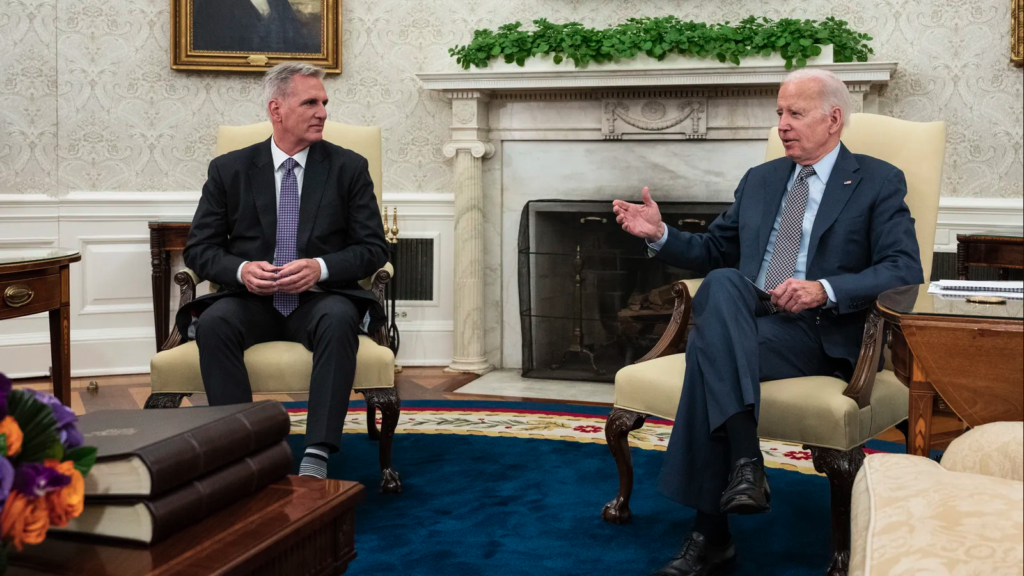
Published 29/05/2023 17:32 | Edited 5/29/2023 5:34 PM
US President Joe Biden said on Sunday (28) that he finalized a budget deal with US House Speaker Kevin McCarthy to extend the $31.4 trillion debt ceiling. According to him, the agreement is ready to be sent to Congress for voting.
In conference calls with lawmakers throughout the day, representatives for President Biden and House Speaker Kevin McCarthy (Republicans-California) argued that the deal represented major victories for their respective parties that needed to be quickly signed into law. Biden and McCarthy also publicly defended the deal, acknowledging that both sides made sacrifices to get the deal done.
“I think it’s a really important step,” Biden told reporters during a brief White House remark following a call with McCarthy to finalize the deal. “It takes the threat of catastrophic default off the table, protects our hard-earned, historic economic recovery.”
The deal will avoid a destabilizing default if it passes the divided Congress before the Treasury Department runs out of cash to cover all its obligations. The Treasury warned on Friday (26) that this would occur if the debt ceiling issue was not resolved by June 5.
From both sides of the political spectrum, there was ridicule for the deal. Representative Pramila Jayapal (Democrats-Wash.), who chairs the Congressional Progressive Caucus, criticized Republicans for the long and acrimonious process that led to the agreement. “You have to ask yourself, ‘What was all this drama for?’ Because they didn’t get what they said they wanted,” said Jayapal. On the other hand, Republicans say the same about the Democrats’ concessions.
Senate Minority Leader Mitch McConnell (Republicans-Ky.), however, issued a statement Sunday night backing the deal.
“The agreement our spokesperson reached with President Biden sets significant limits on the government’s spending agenda. At the same time, it ensures that reforms are allowed and strengthens the link between federal assistance and labor,” said McConnell. “The Senate must act quickly and pass this agreement without undue delay.”
recession in sight
It doesn’t matter who managed to impose their will. Either way, the deal implies spending cuts and belt tightening, which means headwinds for the US economy already weighed down by the highest interest rates in decades and reduced access to credit.
The deal avoids the worst case scenario of a default on payments causing a financial collapse. But it could also, even marginally, increase the risks of a slowdown in the world’s largest economy.
Federal spending in recent quarters has helped support US growth in the face of headwinds, including a slump in home construction, and the debt limit deal will likely at least dampen that momentum. Two weeks before the debt limit deal, economists put the chance of a recession next year at 65%, as a Bloomberg poll showed.
Economists polled by Bloomberg previously pointed to a 0.5% annualized drop in gross domestic product for the third and fourth quarters.
For policymakers at the Federal Reserve, the US central bank, the spending cap is a new variable to consider when updating their own growth forecasts and benchmark interest rate, due to be released on June 14, which should increase by 25 basis points.
This makes fiscal and monetary policy even more restrictive than it already is. They are policies that move in reverse and amplify each other.
The International Monetary Fund said last week that the US would need to tighten its primary budget – that is, excluding debt interest payments – by about 5 percentage points of GDP “to put public debt on a decisively downward path by the end of this decade
search for votes
McCarthy predicted on Sunday that he would have the support of most of his fellow Republicans. That suggests GOP leaders would need at least 111 Republicans to support it, plus up to 107 Democrats to meet the 218-vote threshold needed to pass the House.
The deal has drawn criticism from radical Republicans and progressive Democrats, but Biden and McCarthy believe they have enough votes from moderates on both sides.
The agreement suspends the debt limit until January 2025, limits spending in the 2024 and 2025 budgets, recovers unused funds during covid-19, accelerates the environmental licensing process for some energy projects and includes new requirements for programs of food aid aimed at poor Americans.
The 99-page bill will authorize more than $886 billion in security spending in fiscal 2024 and more than $703 billion in non-security spending in the same year, not including some adjustments. It will also authorize a 1% increase in security spending in fiscal 2025. While Democrats favor spending on social programs, Republicans favor cuts to secure spending on the war and the military.
Members of the hard-line Republican Freedom Caucus said they would try to stop the deal from passing the House in a vote scheduled for Wednesday.
But McCarthy dismissed threats from opposition within his own party, saying “more than 95%” of House Republicans were “extremely enthusiastic” about the deal.
“This is a good, strong bill that most Republicans will vote for,” the California congressman told reporters at the US Capitol.
Republicans control the House 222 votes to 213, while Democrats control the Senate 51 to 49. Those narrow margins mean moderates on both sides will have to back the bill if the compromise loses far-left support. and the extreme right of each party.
The first real test will come when the House Rules Committee meets this week to debate and vote on whether the deal should pass for full consideration on the House floor. Leaders hope the full vote could take place as early as Wednesday. This low-key committee could sink or save the Biden-McCarthy deal.
Progressive Democrats in both houses said they would not support any deal that would place additional requirements on government food and health programs. Sources said this deal would add prerequisites to food aid for people up to age 54.
debt ceiling
Biden has not endorsed abolishing the debt limit, as many Democratic lawmakers — and Treasury Secretary Janet L. Yellen — have. Still, he said the administration could explore at a later date the possibility of invoking the 14th Amendment to the Constitution, which many lawmakers feel makes any debt ceiling unconstitutional.
Congress needs to raise the debt ceiling so that the US can continue to issue bonds, which investors around the world buy because they are seen as a safe and reliable investment. In turn, the government can finance projects ranging from military to social programs.
“I think it will cause more controversy to get rid of the debt limit, although I am exploring the idea that at a later date — a year or two from now — we will decide whether the 14th Amendment” could invalidate the debt limit, Biden said.
Budget experts say the plan could lead to deficits a few hundred billion dollars smaller than previous projections, but it won’t significantly change the trajectory of the federal debt, which is expected to rise to $52 trillion by the end of the decade.
Source: vermelho.org.br

